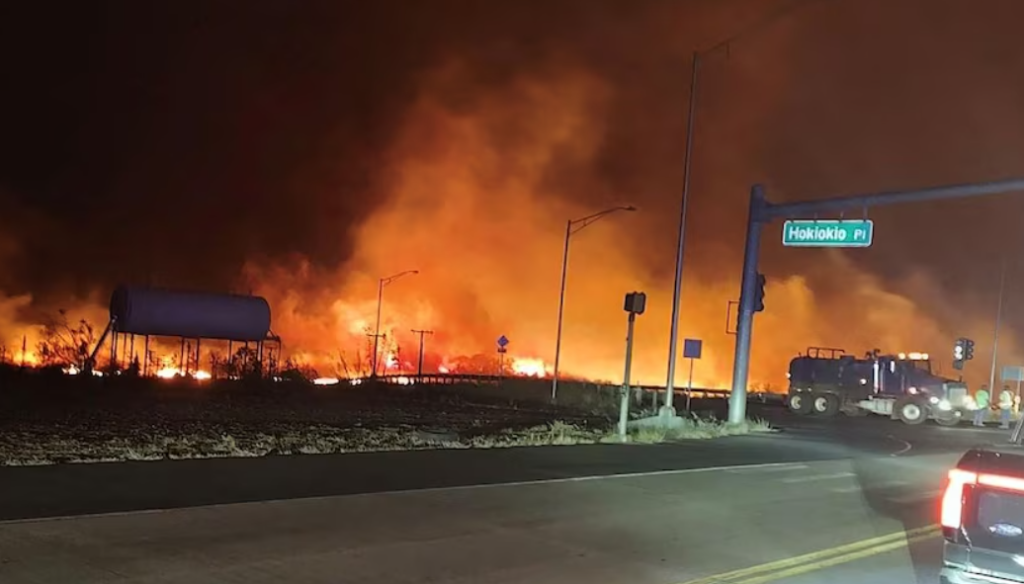Maui Wildfires Force Evacuations into Ocean
The idyllic landscapes of Hawaii are currently marred by a catastrophic event as wildfires, stoked by the powerful winds of an adjacent hurricane, sweep across the islands. This unprecedented disaster has led to numerous evacuations, widespread power outages, homes reduced to ashes, and even desperate residents seeking refuge in the ocean to escape the relentless flames. Multiple regions have been affected, with Lahaina, Kula, and Kihei grappling with the destructive aftermath.

Impact on Key Areas
Maui, one of Hawaii’s iconic islands, has borne the brunt of this calamity. Lahaina, a vibrant residential and tourist hub in West Maui, has seen its commercial district engulfed in flames, prompting evacuations of residents and visitors alike. Kula, nestled in the inland and mountainous Upcountry region, faces the loss of homes as the fires rage on, while Kihei in South Maui, known for its mix of residences, rentals, and visitor facilities, remains in the path of destruction.
Uncertainty Amidst Devastation
The extent of the damage and the number of evacuees remain uncertain, as the fires continue to ravage the island. Multiple structures have already succumbed to the flames, prompting emergency crews to work tirelessly to contain both brush and structural fires. County spokesperson Mahina Martin has emphasized the unprecedented nature of the incident, highlighting the need for collective efforts to combat the disaster.
Government Response
To address the escalating crisis, Acting Governor Sylvia Luke and Maui Mayor Richard Bissen have declared states of emergency, rallying resources to confront the fires. The Hawaii National Guard has been activated to support these efforts, reflecting the gravity of the situation. Meanwhile, the National Weather Service attributes the intensity of the fires to Hurricane Dora’s strong winds and high pressure systems, creating a dangerous combination of low humidity and strong winds, fostering ideal conditions for fire propagation.
Educational Disruption
The crisis has disrupted normalcy in the education sector, with ten public schools in Maui forced to close temporarily. Among them, Lahainaluna High School has been transformed into an evacuation shelter, providing refuge for displaced individuals. The fires have also demonstrated their impact on infrastructure, as power outages, wind damage, and the need for evacuation impede school operations.
Community Response
In the face of such devastation, Hawaii’s resilient spirit has shone through. As flames threatened Lahaina, the Coast Guard undertook heroic efforts, rescuing distressed individuals who sought refuge in the ocean due to the dense smoke and fire conditions. Residents have expressed their shock and sorrow, with one Lahaina resident describing the scene as apocalyptic. The Red Cross has established emergency shelters to accommodate the displaced, offering support to those grappling with uncertainty.
Power Outages and Communication Challenges
The fires have left a trail of destruction, disrupting power supply to over 14,000 customers in Maui County. The aftermath has also brought about communication challenges, with 911 services rendered unavailable in West Maui due to the destruction of infrastructure. The lack of cell service has further complicated evacuation orders and information dissemination, emphasizing the critical role of effective communication during crises.
Fire Behavior and Challenges
The fire’s behavior has been heavily influenced by strong winds, with gusts of up to 80 mph recorded in Kula. These winds have thwarted efforts to deploy helicopters for aerial firefighting, leaving firefighters to contend with blocked roads and unpredictable fire spread. Maui fire officials have cautioned about the volatile combination of terrain, wind patterns, and humidity levels, making it difficult to predict the fire’s path and speed. The risk of embers igniting fires downwind underscores the unpredictable nature of the situation.
Island-Wide Impact
While Maui grapples with the devastating wildfires, the Big Island has also faced its share of challenges, with brush fires threatening homes and necessitating evacuations. The federal government has approved a disaster declaration to aid in containing the fires on the Big Island. The crisis has revealed the vulnerability of Hawaii’s unique ecosystems to natural disasters and the importance of collaborative response efforts.
As Hawaii battles this unprecedented catastrophe, the indomitable spirit of its people and the dedication of emergency responders are evident. The wildfires, exacerbated by hurricane-driven winds, have showcased the fragility of even paradise-like environments in the face of nature’s fury. The ongoing crisis serves as a reminder of the need for preparedness, resilience, and unity in the fight against environmental challenges.



